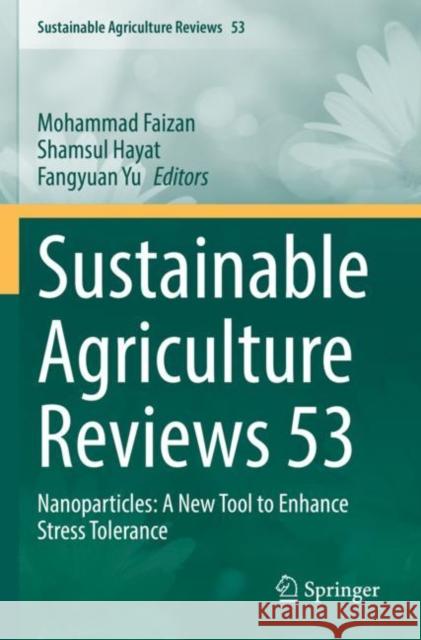Sustainable Agriculture Reviews 53: Nanoparticles: A New Tool to Enhance Stress Tolerance » książka



Sustainable Agriculture Reviews 53: Nanoparticles: A New Tool to Enhance Stress Tolerance
ISBN-13: 9783030868789 / Angielski / Miękka / 2023 / 421 str.
Sustainable Agriculture Reviews 53: Nanoparticles: A New Tool to Enhance Stress Tolerance
ISBN-13: 9783030868789 / Angielski / Miękka / 2023 / 421 str.
(netto: 691,70 VAT: 5%)
Najniższa cena z 30 dni: 693,97
ok. 22 dni roboczych.
Darmowa dostawa!
This book presents recent developments involving the role of nanoparticles on stress tolerance. In particular, nanoparticles have the potential to provide effective solutions to the multiple agriculture-related problems. Nanoparticles present enhanced reactivity and thus better effectiveness when compared to their bulkier counterparts due to their higher surface-to-volume ratio.
This book presents recent developments involving the role of nanoparticles on stress tolerance. In particular, nanoparticles have the potential to provide effective solutions to the multiple agriculture-related problems. Nanoparticles present enhanced reactivity and thus better effectiveness when compared to their bulkier counterparts due to their higher surface-to-volume ratio.
Dr. Mohammad Faizan is Postdoctoral Scientist/Assistant Teacher, in the Department of Silviculture, College of Forestry, Nanjing Forestry University, Nanjing, China. In 2014, he obtained his M.Sc. degree in Botany at Chhatrapati Shahu Ji Maharaj University, Kanpur, India, and his Ph.D. in 2018 at Aligarh Muslim University, Aligarh, India. The findings of his work have revealed that exogenous application of brassinosteroids and nanoparticles improved the yield and quality of plants under natural as well as stressful conditions. He has written one book published by Springer addressing nanotechnology for plant growth and development and has authored or co-authored six book chapters. Findings of his research works have been published in the Ecotoxicology and Environmental Safety, Nitric Oxide, Plant Physiology and Biochemistry, Journal of Plant Growth Regulation, Current Protein & Peptide Science, Photosynthetica, South African Journal of Botany, IET Nanotechnology, Russian Journal of Plant Physiology, Biocell and many more with more than 540 google scholar citation and 10 h-index. He is also member of the editorial board of the Journal of Plant Sciences and is also member of various societies.
Nanoscience and nanotechnology imply the study of nanoparticles with at least one dimension below 100 nm with potential for application in a variety of sectors, including in agriculture, therapeutics, diagnostics, engineering, food industry and safety, environmental remediation, and energy infrastructure. This book presents recent developments involving the role of nanoparticles on stress tolerance. In particular, nanoparticles have the potential to provide effective solutions to the multiple agriculture-related problems. Nanoparticles present enhanced reactivity and thus better effectiveness when compared to their bulkier counterparts due to their higher surface-to-volume ratio. In addition, nanoparticles offer the potential to leverage unique surface chemistry as compared to traditional approaches, such that they can be functionalized or grafted with functional groups that can target specific molecules of interest for efficient remediation. Recent findings on the increased use of nanoparticles in agriculture by densely populated countries such as China and India, indicate that this technology may impart a substantial impact on tolerance against stresses, malnutrition, and crop loss.
Stresses represent the main constraint for agriculture, affecting plant growth and productivity worldwide. Yield losses in agriculture will be potentiated in the future by global warming, increasing contamination, and reduced availability of fertile land. The challenge of the present and future agriculture is to increase the food supply for a continuously growing human population under environmental conditions that are deteriorating in many areas of the world. This book addresses these issues and many more. Chapters incorporate both theoretical and practical aspects of nanoparticle impacts on plant tolerance against stresses and may serve as baseline information for future research through which significant development is possible. This book will be useful to researchers, instructors and students both in universities and research institutes, especially in relation to biological and agricultural sciences.
1997-2026 DolnySlask.com Agencja Internetowa
KrainaKsiazek.PL - Księgarnia Internetowa









